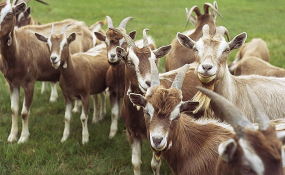Africa: Goat Gives Birth to 'Human' Kids... for Real?

A photo of "human" kids delivered by a goat in Nigeria's Yobe state went viral on social media recently. In June 2017, a similar incident was reported in South Africa's Eastern Cape province where a sheep supposedly gave birth to "human babies".
Along with photographs of the deformed creatures, lots of theories circulated of how they came to be.
In Nigeria, social media users accused the owner of having had sex with the goat. In the Eastern Cape, people believed the stillborn lamb was a product of witchcraft or the work of the devil.
What exactly are we seeing in these photographs?
Neither bestiality nor magic
First things first: It is biologically impossible for humans to cross-breed with goats or sheep, Dr Carina Visser, senior lecturer in the department of animal and wildlife sciences at the University of Pretoria, told Africa Check.
"In genetic terms, each species has a unique number of chromosomes," she explained. "Some species, such as horses and donkeys are related and have very similar chromosome number (62 versus 64), and thus can breed and produce live offspring.
"However, humans have 46 chromosomes, while goats have a total of 60. Given this, it is impossible for these species to even produce a viable embryo or fetus, let alone offspring."
Neither was magic involved, research technician at the Agricultural Research Council Leon Kruger told Africa Check. These images show what is known as a "monster fetus", he explained.
Kruger said a monster fetus may be caused by genetic abnormalities. "This fetus looks strange [and] usually dies in the womb. If it is born alive, it will die soon after," Kruger said.
Certain diseases or malnutrition of the mother can also cause malformation of the fetus, Visser noted.
"There are many reasons that may cause this, but reproductive abnormalities are mostly due to inbreeding," Prof Voster Muchenje from the University of Fort Hare's department of livestock and pasture science told Africa Check. Muchenje is also editor-in-chief of the South African Journal of Animal Science.
Inbreeding - where closely related animals of the same species mate - "is very common in farming areas with limited resources", he added. In such areas, farmers may not exchange or cull the few mating animals they have, especially male animals.
Still, a monster fetus "is quite rare", Muchenje said.


















No comments: